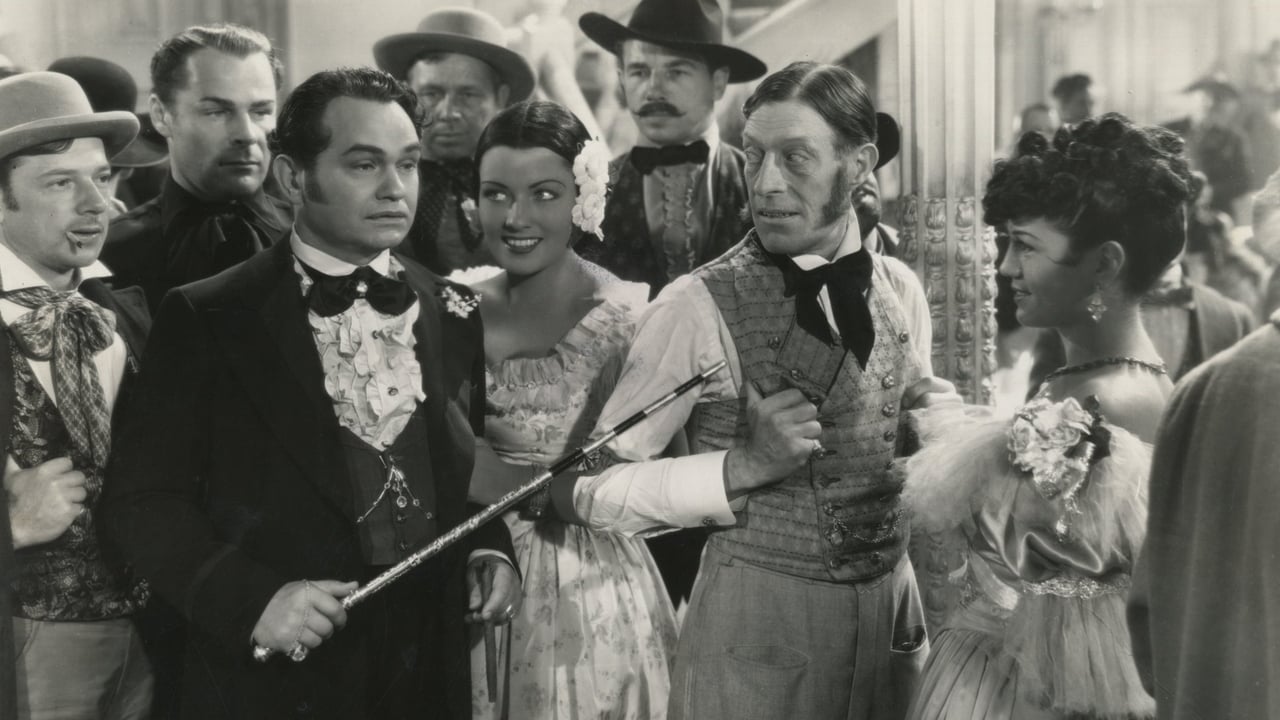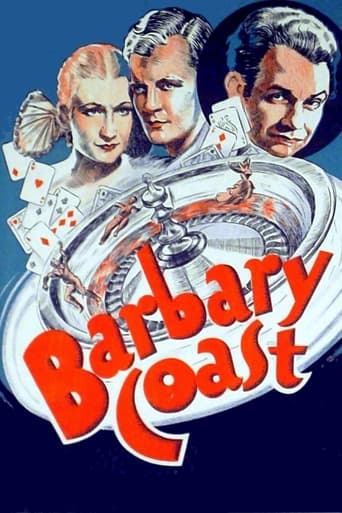Ensofter
Overrated and overhyped
Platicsco
Good story, Not enough for a whole film
Motompa
Go in cold, and you're likely to emerge with your blood boiling. This has to be seen to be believed.
Kayden
This is a dark and sometimes deeply uncomfortable drama
gab-14712
I miss films like 1935's Barbary Coast. These are the kind of old-fashioned melodramas that have been driven to extinction. I am not entirely sure that this movie would have been the best kind of old-fashioned film, but it has all the elements that I come to expect from these type of films. For the most part, the film was very entertaining. There is a romanticized and somewhat crass love triangle that lays at the heart of the film. I like this unconventional (for its time) love triangle because it plays to the dark side. The cinematography really plays well to the tone and the atmosphere. There is an abundance of fog and that really gives a sense of mystery to the city of San Francisco, which was known as Barbary Coast to its citizens during the time period the film is set in. This film was directed by Howard Hawks, who is known as one of cinema's greatest auteurs. It is not his greatest film, and I would even call this film a major B-production (which means it still is good, but not great.) This marks Hawk's first production with famed producer Samuel Goldwyn. For this movie, Goldwyn came up with the title and tasked two of Hollywood's best writers; Ben Hecht and Charles MacArthur to create a story under that title. In addition to the love story, they created themes you could pull out of a Western. They created a tale about how you can survive in the lawless West. There is this gold digger named Mary Rutledge (Miriam Hopkins) who arrives by boat to the shores of San Francisco to meet up with her mail-order husband. She comes to find out that he mysteriously died after falling in debt to a gangster named Louis Chamalis (Edward G. Robinson). Louis also happened to be the owner of the nightclub where Mary's husband owed debt to. Mary decides to get work as a roulette operator in the saloon of Chamalis. He admits to her that he has fallen in love with her, but she does not return his love. During one walk in a rainstorm, she falls in love after meeting gold prospector Jim Carmichael (Joel McCrea). Jim is on his way home with several bags full of gold he found. Chamalis is going to do all he can to grab that gold and make Mary love him the way he loved her. The movie has several great performances to work with. Miriam Hopkins is a great actress, although stories have been told how hard it was to work with her. Maybe her personality worked well with the type of unsympathetic character she was portraying, because I could not stand her character for a long part of the movie and that is how it was meant to be. Edward G. Robinson gave a great, villainous performance. He looked every part of the villain type, even with that ugly-looking earring on his one ear. The rest of the cast including the likes of Walter Brennan and David Niven in a very early cameo role do a great job. The one thing that stood out to me the most was how women was portrayed. Hopkins portrays a character who is strong-willed and performs tasks that guys would do (remember this film came out in 1935.) This was a rarity for its time. Barbary Coast is a lesser Howard Hawks film, but this is a legend we are talking about. The movie was still a very entertaining ride from start to finish. This film might even have the only rowboat chase scene in any movie ever released, so that is another reason why you might want to give this oldie a watch. My Grade: B
Richard Burin
A mediocre Hawks entertainment, on his usual theme of tough, displaced men and women falling in love, with a very strong cast but a rather trite and badly-paced storyline. Miriam Hopkins is the self-consciously tough broad who pitches up in Gold Rush-era San Francisco, and allies herself to casino owner Edward G. Robinson – who has a really funny, ever-present curl trespassing onto the right hand side of his face – only to fall for soppy poet Joel McCrea. To get an idea of just how sanitised the movie is, it's worth noting that Joseph Breen, the head of the Hays Office, thought the original script was the filthiest thing he'd ever read, but regarded the film as absolutely charming. There's some wonderfully poetic Ben Hecht-Charles MacArthur dialogue in the opening exchanges ("However soiled his hands, the journalist goes staggering through life with a beacon raised" – just beautiful), but it dries up alarmingly quickly, while the story degenerates into tiresome bickering, before reinventing itself as a gruesome love letter to vigilantism. Breen seemed to espouse a strict pro-death-penalty, anti- double-bed viewpoint that's difficult to get on board with nowadays. (I'm also not sure what the form is on everybody celebrating the arrival of a "white woman" - seems a bit racist.)There are a few atmospheric shots in fog-shrouded San Francisco – though conveying the sweep of the burgeoning town is never even attempted – but the real selling point is the performances. Hopkins gives one of those faintly wooden, sub-Stanwyck, but nonetheless intriguing performances combining genuine, even enrapturing emotional attractiveness with the ability to be a bit irritating, while both Walter Brennan and Robinson make the most of familiar roles: Brennan a hoarse crook with an eyepatch and a quietly-emerging conscience, Robinson a menacingly-mewling tough guy who doesn't really understand how love works. McCrea is cast in one of those parts that can come off as unbearably smug (I'm thinking of Leslie Howard's horrendous role in The Petrified Forest), while the script asks him to swallow some rather questionable plot developments, but he's not bad, playing more fey and sensitive than was usually required. There's also a very funny bit part for J.M Kerrigan, who shines as a drunk judge in an incongruous, inappropriate but riotous comic interlude. Barbary Coast never really manages to clamber over its main obstacle – a disjointed, at times slightly tedious story – but some very nice acting and the odd good line or arty shot make it worth a look, especially for fans of the director.
Michael_Elliott
Barbary Coast (1935) *** 1/2 (out of 4)Masterful acting highlight this overlooked gem that features just about everything you'd want out of a classic from the Golden Era of movies. Miriam Hopkins plays a poor girl from New York who travels to San Francisco to marry a man she's never met but once she arrives she learns that he has been murdered. Since she didn't love him, she decides to team up with the man responsible for his death, a ruthless casino owner (Edward G. Robinson) who wants to keep the town under his rule. Soon the woman begins to have second thoughts after meeting young man (Joel McCrea) from her old hometown. Hawks has a big following today and many consider him one of the greatest director's of all time but I'm really not sure I'd join such high praise. I did find it rather strange that when people mention his work this title is often left out, which is too bad because I found this to be one of the most entertaining of his career even though he did take the picture over from William Wyler. Some have called this LITTLE CAESAR set during the gold rush and that might be a fair saying but you could also mix in another Robinson picture, THE HATCHET MAN. This film here is pulp entertainment from start to finish as we have three legends really giving it their all in a pretty good story that contains romance, action, drama, comedy and one masterfully directed sequence. This sequence takes place as a vigilante group is holding a trial while walking through some mud. The sound effects used here and the constant editing down towards the mud is priceless and will certainly remain in the viewers mind long after the film ends. Robinson dives head first into his role and really delivers one of the finest performances of his career. His scenes where the character goes mad or better yet, love struck, are priceless and really pack a nice little punch as he goes off the deep end. The evilness Robinson brings to the role was not only creepy but it added to the entertainment value just because it will also put a smile on your face. Hopkins is also terrific and manages to deliver a full performance full of all sorts of emotions. Her character goes through various stages and the actress captures all of them perfectly. Her and Robinson have wonderful chemistry and I was shocked to learn after the movie that the two hated working with one another on this film. McCrea is also terrific and plays the naive and soft-spoken character wonderfully. The supporting cast features the wonderful Walter Brennan, Frank Craven, Brian Donlevy, Harry Carey and Donald Meek. The film's biggest problem is the ending, which really felt added on but I haven't been able to find anywhere that it was forced by the studio. Why this film isn't better known is beyond me but there's enough packed in here for two movies so hopefully more people will check it out.
rsyung
Somewhat run-of-the-mill period piece combining characters and story points probably seen to better effect elsewhere. I could accept E. G. Robinson in his role as a swaggering casino owner in his puffy shirt and earring (and severe sidechops), and he leavens his evildoing with a little bit of pathos in his yearning for a woman who will love him for himself. Poor sap hasn't learned that having people shot in the back is a poor way to impress a woman. Miriam Hopkins does a fine job, mostly, but she sometimes uses her eyebrows to punctuate her dialog a little too much. Hawks should have told her to tone down the brow action a little. The opening sequence as the ship pulls into a fog-enshrouded San Francisco Bay is beautifully shot.

